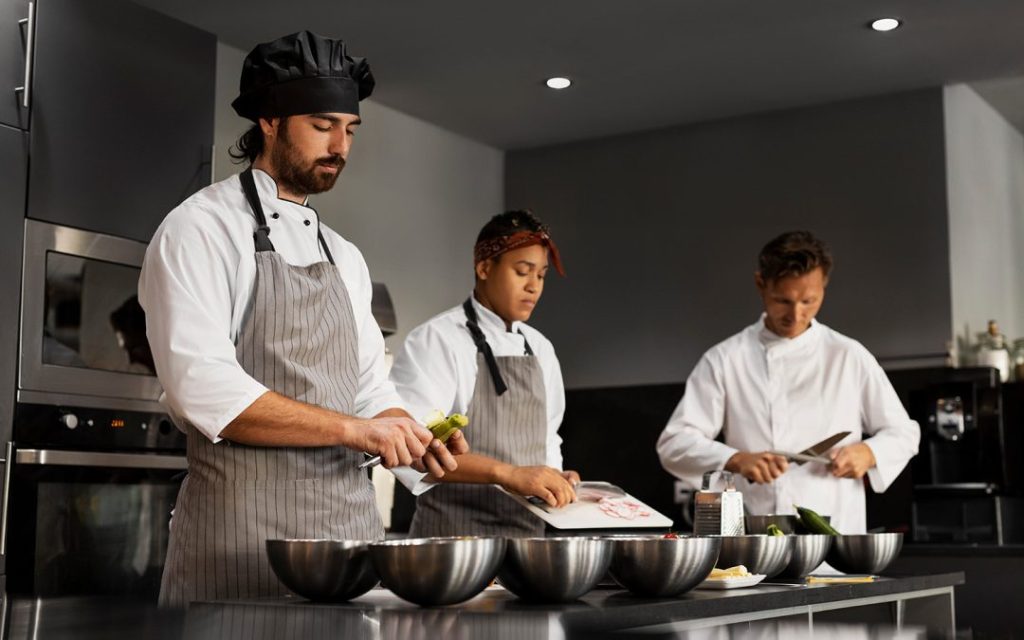Behind the Gleaming Kitchens: The Unsung Heroes Transforming Singapore’s Hospitality Industry

Stewards solution providers across Singapore have quietly revolutionised the backbone of the hospitality industry, creating systems that balance the gruelling demands of commercial kitchens with the dignity of those who keep them running. Walking through the spotless corridors of any five-star hotel, guests remain blissfully unaware of the intricate choreography happening behind swinging doors, where armies of stewarding staff maintain the heartbeat of culinary operations.
The Invisible Workforce
They begin their shifts before dawn and finish long after midnight. In the fluorescent-lit underworld of hotel kitchens, stewarding teams move with practiced precision, their hands constantly in motion—scrubbing, sorting, stacking, sanitising. Their work exists in the negative space of luxury, defined by what doesn’t happen: the absence of dirty dishes, the non-existence of kitchen chaos, the disappearance of waste.
“People only notice stewarding when something goes wrong,” explains Tan Mei Lin, a hospitality consultant with twenty years of experience in Singapore’s luxury hotel sector. “When everything runs smoothly, the stewards are invisible. That invisibility is actually the mark of their success.”
Yet this success comes at considerable human cost. The stewarding department typically employs workers from the most vulnerable segments of society—recent immigrants, older workers with limited education, individuals with few other employment options. Their labour makes possible the seamless dining experiences that guests take for granted.
The Physical Toll
The physical demands of hotel kitchen stewarding transcend what most office workers could imagine:
- Standing for 10-12 hour shifts on wet tile floors
- Lifting 20-kilogram trays of glassware dozens of times daily
- Enduring temperatures that swing between the scalding heat of washing stations and the bone-chilling cold of walk-in refrigerators
- Handling harsh chemicals that leave hands cracked and raw
- Working in environments where decibel levels regularly exceed safe hearing thresholds
“My hands tell the story of my twenty years,” says Mr. Lim, a head steward at a luxury hotel along Orchard Road. He stretches out fingers that have become permanently curved from decades of gripping wet plates and heavy trays. “We joke that you can always identify a lifetime steward by their hands.”
The Dignity Paradox
The contradiction lies at the heart of luxury hospitality: institutions dedicated to treating guests with the utmost dignity often struggle to extend the same consideration to their lowest-paid workers. Stewarding departments have historically been treated as cost centres rather than essential infrastructure, leading to chronic understaffing and underinvestment.
“The hierarchy in hotel operations places stewarding at the bottom,” notes Dr. Siti Aminah, who researches labour conditions in Singapore’s hospitality sector. “This creates a troubling dynamic where those responsible for hygiene and sanitation—arguably the most important aspect of food service—are valued least.”
This devaluation manifests in practical ways: stewarding areas are frequently designed as afterthoughts, crammed into whatever space remains after more prestigious departments have claimed their territory. Break rooms, if they exist at all, are often repurposed storage areas with inadequate ventilation and seating.
The Technological Revolution
Recent years have witnessed a dramatic shift in how Singapore’s leading hotels approach stewarding operations. Automation has begun transforming the landscape:
- Flight-type dishwashers that can process 8,000 plates per hour
- Waste management systems that automatically sort, compact, and process kitchen refuse
- RFID tracking for expensive serviceware that reduces losses and prevents theft accusations
- Ergonomic dish trolleys that reduce injury risk during transportation
- Chemical dosing systems that eliminate exposure to concentrated cleaning agents
“The technology available today would have seemed miraculous when I started,” reflects Mr. Lim. “The modern stewards solution incorporates systems that protect workers’ bodies while improving efficiency. It’s a rare win-win.”
The Human Element Persists
Despite technological advances, the essential human component of stewarding remains irreplaceable. The most sophisticated machinery cannot navigate the unpredictable chaos of a kitchen during peak service or make judgment calls about priorities when systems are overwhelmed.
“Technology helps, but ultimately stewarding is about human relationships,” explains Ms. Phua, a stewarding manager with fifteen years in the industry. “It’s about understanding the rhythm of each chef, anticipating needs before they’re expressed, and maintaining calm when everyone else is panicking.”
This human element extends to managing the complex social dynamics of stewarding departments, which often bring together workers from diverse cultural backgrounds with varying language abilities and cultural practices. Effective stewarding managers must serve as cultural translators and conflict mediators while maintaining the relentless pace of operations.
The Path Forward
Progressive hotels have begun recognising that investing in stewarding yields returns beyond clean dishes. Well-designed stewarding operations reduce breakage, extend equipment lifespan, improve kitchen safety, and contribute to sustainability goals through better resource management.
“The most forward-thinking establishments see that dignified conditions for stewarding staff translate directly to operational excellence,” says hospitality consultant Richard Tan. “When you treat stewards as essential professionals rather than disposable labour, the entire operation benefits.”
This recognition has sparked a gradual reimagining of what hotel kitchen stewarding can become: not merely a necessary burden, but a sophisticated operation where technology and human skill combine to create systems that serve both operational needs and human dignity.






